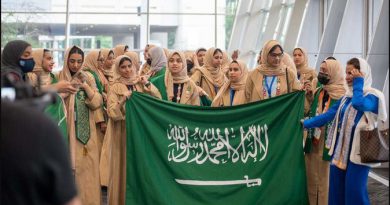Iraq sees risk of regional conflict if Gaza war resumes
Baghdad (Reuters) – Iraq sees a risk of regional conflict if the current truce in Gaza is not turned into a permanent ceasefire, the Iraqi prime minister’s foreign affairs adviser said, as mediators sought an extension of the temporary four-day Israel-Hamas truce.
Israel’s devastating bombardment of Gaza in response to Hamas’ Oct. 7 attack on Israel has drawn in Iran-aligned armed groups in the region including Lebanese Hezbollah and several Iraqi factions, who have mounted near-daily attacks on Israeli and U.S. forces.
But there have been no reports of attacks on U.S. forces in Iraq or Syria since Israel and Hamas began a four-day truce last week that was set to expire on Monday, compared to over 70 in the weeks prior.
Some of the main Iraqi armed factions behind the recent attacks, including Kataib Sayyid al-Shuhada and Kataeb Hezbollah, have announced they will abide by the Gaza ceasefire but indicated they would resume attacks if it ends.
They have also said in statements that they still seek the eventual ouster of U.S. forces in Iraq. There are around 2,500 U.S. troops on a mission the U.S. says is to advise and assist Iraqi forces battling remnants of Islamic State.
“The entire region is on the verge of a devastating conflict that may include everyone, and the extent of its expansion or how to control and stop it is not known,” said Farhad Alaadin, foreign affairs adviser to Iraqi Prime Minister Mohammed Shia al-Sudani.
“For this reason, we see any ceasefire in the conflict as beneficial and important at this stage for the people of Palestine and Gaza first and for all countries in the region, including Iraq,” he told Reuters.
European Union Ambassador to Iraq Thomas Seiler said in a social media post that he hopes Iraqi factions “continue with their cessation of attacks.”
Two sets of U.S. strikes in Iraq last week killed 10 members of Kataeb Hezbollah, according to posts by the group on social media, a move condemned by the Iraqi government as escalatory and a violation of sovereignty.
Kataeb Hezbollah is part of Iraq’s Popular Mobilization Forces (PMF), a group of mostly Shi’ite Muslim armed groups formed to fight Islamic State in 2014 that became an official security agency under the command of the prime minister.
While technically part of the state, some of the PMF’s most powerful Iran-backed factions often act outside the chain of command. Sudani has said attacks by armed groups on foreign forces in Iraq were unlawful and went against the country’s national interest.


